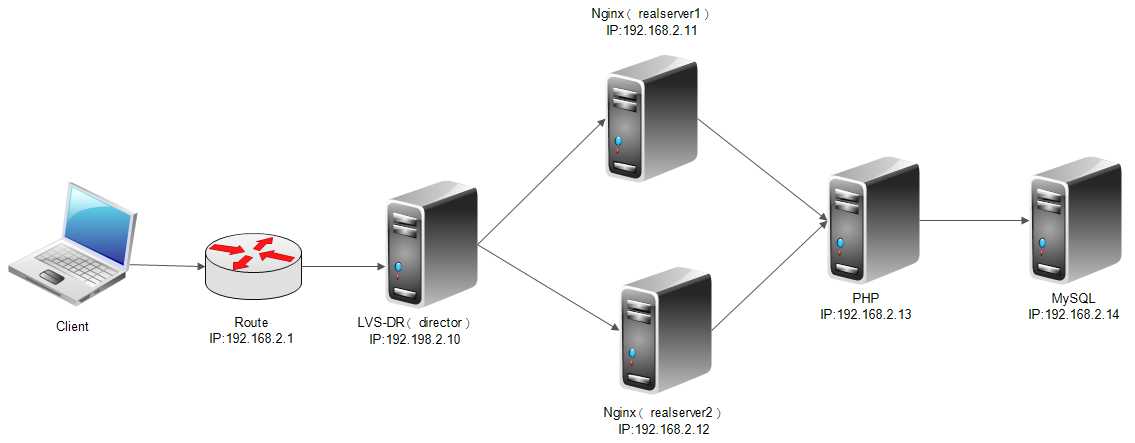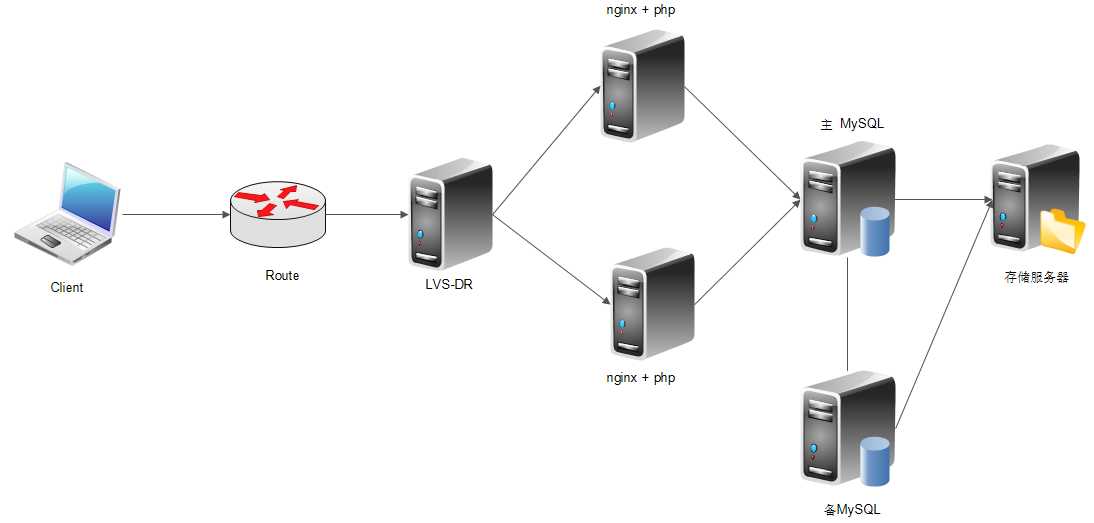标签:
要求:
1. wordpress程序通过nfs共享给各个realserver
2. 后端realserver中的nginx和php分离
网络结构图:

环境说明:
OS:centos6.7 x64
主机IP:
LVS-DR(director): 192.168.2.10
realsever1 web1 Nginx: 192.168.2.11
realserver2 web2 Nginx: 192.168.2.12
PHP server: 192.168.2.13
MySQL server: 192.168.2.14
主机名:
lvs-dr: 192.168.2.10
realserver1: 192.168.2.11
realserver2: 192.168.2.12
php-server: 192.168.2.13
mysql-server: 192.168.2.14
selinux: disabled
内网iptables: off
一、安装nginx、MySQL
1. Nginx 安装:
需要安装的主机:
Nginx:192.168.2.11、192.168.2.12
MySQL:192.168.2.14
192.168.2.11:
(1) 搭建本地yum源:
[root@realserver1 yum.repos.d]# yum install gcc* -y # 安装gcc开发环境,为了编译安装nginx使用 [root@realserver1 yum.repos.d]# yum install ntpdate wget -y # ntpdate 时间同步,wget 下载nginx [root@realserver1 yum.repos.d]# ntpdate -s tiger.sina.com.cn # 同步时间 [root@realserver1 src]# wget http://mirrors.sohu.com/nginx/nginx-1.9.9.tar.gz # 下载nginx-1.9.9包 [root@realserver1 src]# groupadd -g 800 www [root@realserver1 src]# useradd -u 800 -g 800 -s /sbin/nologin www # 创建nginx worker进程工作用户 [root@realserver1 nginx-1.9.9]# yum install zlib zlib-devel pcre pcre-devel openssl openssl-devel -y # pcre 支持正则表达式 # zlib 支持数据压缩 # openssl支持HTTPS [root@realserver1 src]# tar xf nginx-1.9.9.tar.gz [root@realserver1 src]# cd nginx-1.9.9 [root@realserver1 nginx-1.9.9]# ./configure --prefix=/usr/local/nginx --user=nginx --group=nginx --with-http_ssl_module --with-http_stub_status_module --with-http_gzip_static_module --with-http_realip_module --with-pcre # --with-http_ssl_module 启用HTTPS加密 # --with-http_stub_status_module 启用nginx状态监控 # --with-http_gzip_static_module 启用静态压缩 # --with-http_realip_module 做代理时获取客户端真实IP [root@realserver1 nginx-1.9.9]# make && make install [root@realserver1 nginx-1.9.9]# vim /etc/init.d/nginx # 创建nginx服务脚本 #!/bin/sh # # nginx - this script starts and stops the nginx daemon # # chkconfig: - 85 15 # description: Nginx is an HTTP(S) server, HTTP(S) reverse \ # proxy and IMAP/POP3 proxy server # processname: nginx # config: /etc/nginx/nginx.conf # config: /etc/sysconfig/nginx # pidfile: /var/run/nginx.pid # Source function library. . /etc/rc.d/init.d/functions # Source networking configuration. . /etc/sysconfig/network # Check that networking is up. [ "$NETWORKING" = "no" ] && exit 0 nginx="/usr/local/nginx/sbin/nginx" prog=$(basename $nginx) NGINX_CONF_FILE="/usr/local/nginx/conf/nginx.conf" [ -f /etc/sysconfig/nginx ] && . /etc/sysconfig/nginx lockfile=/var/lock/subsys/nginx start() { [ -x $nginx ] || exit 5 [ -f $NGINX_CONF_FILE ] || exit 6 echo -n $"Starting $prog: " daemon $nginx -c $NGINX_CONF_FILE retval=$? echo [ $retval -eq 0 ] && touch $lockfile return $retval } stop() { echo -n $"Stopping $prog: " killproc $prog -QUIT retval=$? echo [ $retval -eq 0 ] && rm -f $lockfile return $retval killall -9 nginx } restart() { configtest || return $? stop sleep 1 start } reload() { configtest || return $? echo -n $"Reloading $prog: " killproc $nginx -HUP RETVAL=$? echo } force_reload() { restart } configtest() { $nginx -t -c $NGINX_CONF_FILE } rh_status() { status $prog } rh_status_q() { rh_status >/dev/null 2>&1 } case "$1" in start) rh_status_q && exit 0 $1 ;; stop) rh_status_q || exit 0 $1 ;; restart|configtest) $1 ;; reload) rh_status_q || exit 7 $1 ;; force-reload) force_reload ;; status) rh_status ;; condrestart|try-restart) rh_status_q || exit 0 ;; *) echo $"Usage: $0 {start|stop|status|restart|condrestart|try-restart|reload|force-reload|configtest}" exit 2 esac [root@realserver1 conf]# chmod +x /etc/init.d/nginx [root@realserver1 nginx-1.9.9]# cd /usr/local/nginx/conf/ [root@realserver1 conf]# vim nginx.conf 2 user www www; [root@realserver1 conf]# vim /etc/profile.d/nginx.sh [root@realserver1 conf]# source /etc/profile.d/nginx.sh [root@realserver1 conf]# nginx -t nginx: the configuration file /usr/local/nginx/conf/nginx.conf syntax is ok nginx: configuration file /usr/local/nginx/conf/nginx.conf test is successful [root@realserver1 conf]# service nginx start 正在启动 nginx: [确定] [root@realserver1 conf]# chkconfig --add nginx [root@realserver1 conf]# chkconfig nginx on [root@realserver1 conf]# chkconfig --list nginx nginx 0:关闭 1:关闭 2:启用 3:启用 4:启用 5:启用 6:关闭 [root@realserver1 conf]# curl -I http://192.168.2.11 # 测试本地访问nginx服务 HTTP/1.1 200 OK Server: nginx/1.9.9 Date: Sun, 19 Jun 2016 06:15:11 GMT Content-Type: text/html Content-Length: 612 Last-Modified: Sun, 19 Jun 2016 06:03:48 GMT Connection: keep-alive ETag: "576635c4-264" Accept-Ranges: bytes
测试客户端访问:

修改nginx配置文件如下:
行号 43 location / { 44 root /webapp; 45 index index.html index.htm; 46 } 65 location ~ \.php$ { 66 root /webapp; 67 fastcgi_pass 192.168.2.13:9000; 68 fastcgi_index index.php; 69 include fastcgi.conf; 70 } 保存退出
[root@realserver1 conf]# mkdir /webapp [root@realserver1 conf]# chown -R www:www /webapp/ [root@realserver1 conf]# nginx -t nginx: the configuration file /usr/local/nginx/conf/nginx.conf syntax is ok nginx: configuration file /usr/local/nginx/conf/nginx.conf test is successful [root@realserver1 conf]# service nginx reload nginx: the configuration file /usr/local/nginx/conf/nginx.conf syntax is ok nginx: configuration file /usr/local/nginx/conf/nginx.conf test is successful 重新载入 nginx: [确定]
realserver2 nginx配置如上同样进行配置,这里不在贴代码。
(2) MySQL: 192.168.2.14:
[root@mysql-server ~]# wget http://mirrors.sohu.com/mysql/MySQL-5.6/mysql-5.6.31-linux-glibc2.5-x86_64.tar.gz [root@mysql-server ~]# tar xf mysql-5.6.31-linux-glibc2.5-x86_64.tar.gz -C /usr/local/ [root@mysql-server local]# groupadd -g 306 mysql [root@mysql-server local]# useradd -u 306 -g 306 -s /sbin/nologin mysql [root@mysql-server local]# mkdir -pv /mydata/data mkdir: created directory `/mydata‘ mkdir: created directory `/mydata/data‘ [root@mysql-server local]# chown -R mysql:mysql /mydata/ [root@mysql-server local]# cd mysql [root@mysql-server mysql]# chown -R root:mysql . [root@mysql-server mysql]# yum install libaio -y [root@mysql-server mysql]# ./scripts/mysql_install_db --user=mysql --datadir=/mydata/data/ [root@mysql-server mysql]# cp -a support-files/mysql.server /etc/init.d/mysqld [root@mysql-server mysql]# chmod +x /etc/init.d/mysqld [root@mysql-server mysql]# mv /etc/my.cnf /etc/my.cnf_old [root@mysql-server mysql]# cp -a support-files/my-default.cnf /etc/my.cnf [root@mysql-server mysql]# vim /etc/my.cnf # 添加如下一条 datadir=/mydata/data [root@mysql-server mysql]# ln -vs /usr/local/mysql/include /usr/include/mysql `/usr/include/mysql‘ -> `/usr/local/mysql/include‘ [root@mysql-server mysql]# vim /etc/ld.so.conf.d/mysql.conf [root@mysql-server mysql]# ldconfig -v | less [root@mysql-server mysql]# service mysqld start Starting MySQL. SUCCESS! [root@mysql-server mysql]# ss -ntl | grep 3306 LISTEN 0 80 :::3306 :::*
到此,nignx和mysql安装完毕。
(3) php 安装:
[root@php-server yum.repos.d]# yum install wget gcc* -y # 添加epel源 [root@php-server ~]# vim /etc/yum.repos.d/epel-centos6.repo [epel] name=Extra Packages for Enterprise Linux 6 - $basearch baseurl=http://download.fedoraproject.org/pub/epel/6/$basearch #mirrorlist=https://mirrors.fedoraproject.org/metalink?repo=epel-6&arch=$basearch failovermethod=priority enabled=1 gpgcheck=0 gpgkey=file:///etc/pki/rpm-gpg/RPM-GPG-KEY-EPEL-6 [epel-debuginfo] name=Extra Packages for Enterprise Linux 6 - $basearch - Debug baseurl=http://download.fedoraproject.org/pub/epel/6/$basearch/debug #mirrorlist=https://mirrors.fedoraproject.org/metalink?repo=epel-debug-6&arch=$basearch failovermethod=priority enabled=0 gpgkey=file:///etc/pki/rpm-gpg/RPM-GPG-KEY-EPEL-6 gpgcheck=0 [epel-source] name=Extra Packages for Enterprise Linux 6 - $basearch - Source baseurl=http://download.fedoraproject.org/pub/epel/6/SRPMS #mirrorlist=https://mirrors.fedoraproject.org/metalink?repo=epel-source-6&arch=$basearch failovermethod=priority enabled=0 gpgkey=file:///etc/pki/rpm-gpg/RPM-GPG-KEY-EPEL-6 gpgcheck=0 保存退出 # 安装php源码包的依赖包 [root@php-server yum.repos.d]# yum install libmcrypt libmcrypt-devel mhash mhash-devel install libxml2-devel openssl openssl-devel bzip2-devel libcurl-devel gd -y # gd-devel-2.0.35-11.el6.x86_64.rpm 从网上下载到的包安装,直接百度搜包名就有。 [root@php-server ~]# yum localinstall gd-devel-2.0.35-11.el6.x86_64.rpm -y [root@php-server ~]# groupadd -g 800 www [root@php-server ~]# useradd -u 800 -g 800 -s /sbin/nologin www # 创建运行php worker进程用户 [root@php-server ~]# cd /usr/local/src/ [root@php-server src]# wget http://mirrors.sohu.com/php/php-5.6.7.tar.gz [root@php-server php-5.6.7]# cd php-5.6.7 [root@php-server php-5.6.7]# ./configure --prefix=/usr/local/php --enable-fpm --enable-ftp --enable-zip \
--enable-xml --enable-sockets --enable-bcmath --enable-pcntl --enable-shmop --enable-soap --enable-sysvsem \
--enable-mbstring --enable-mbregex --enable-inline-optimization --enable-maintainer-zts --enable-gd-native-ttf \
--with-fpm-user=www --with-fpm-group=www --with-mysql --with-mysqli --with-pdo-mysql --with-openssl --with-freetype-dir \
--with-iconv-dir --with-jpeg-dir --with-png-dir --with-libxml-dir=/usr --with-curl --with-zlib --with-bz2 --with-xmlrpc \
--with-gd --with-config-file-path=/usr/local/php/etc --with-config-file-scan-dir=/usr/local/php/etc/php.d [root@php-server php-5.6.7]# make && make install # 编译时间比较长 [root@php-server php-5.6.7]# cp -a sapi/fpm/init.d.php-fpm /etc/init.d/php-fpm [root@php-server php-5.6.7]# chmod +x /etc/init.d/php-fpm [root@php-server php-5.6.7]# cp -a php.ini-production /usr/local/php/etc/php.ini [root@php-server php-5.6.7]# cd /usr/local/php/etc/ [root@php-server etc]# cp -a php-fpm.conf.default php-fpm.conf [root@php-server etc]# vim php-fpm.conf # 修改监听地址 164 listen = 192.168.2.13:9000 [root@php-server etc]# service php-fpm start Starting php-fpm done [root@php-server etc]# ss -ntl | grep 9000 LISTEN 0 128 192.168.2.13:9000 *:* [root@php-server etc]# chkconfig --add php-fpm [root@php-server etc]# chkconfig php-fpm on [root@php-server etc]# iptables -F [root@php-server etc]# iptables -X [root@php-server etc]# iptables -A INPUT -m state --state RELATED,ESTABLISHED -j ACCEPT [root@php-server etc]# iptables -A INPUT -p tcp -m multiport --sport 22,9000 -m state --state NEW -j ACCEPT [root@php-server etc]# iptables -P INPUT DROP [root@php-server etc]# service iptables save iptables: Saving firewall rules to /etc/sysconfig/iptables:[ OK ] [root@php-server etc]# service iptables restart iptables: Setting chains to policy ACCEPT: filter [ OK ] iptables: Flushing firewall rules: [ OK ] iptables: Unloading modules: [ OK ] iptables: Applying firewall rules: [ OK ]
php 安装完毕。
(3) nginx 连接 php
nginx对于php的配置上面已经写过了:
修改nginx配置文件如下:
行号 43 location / { 44 root /webapp; 45 index index.html index.htm; 46 } 65 location ~ \.php$ { 66 root /webapp; 67 fastcgi_pass 192.168.2.13:9000; 68 fastcgi_index index.php; 69 include fastcgi.conf; 70 } 保存退出
连接nfs共享web程序
php-sever 192.168.2.13 设置如下:
[root@php-server etc]# yum install nfs-utils -y # 使用桌面虚拟机可能会碰到nfs需要重启下机器的情况 [root@php-server ~]# service nfs start Starting NFS services: [ OK ] Starting NFS mountd: [ OK ] Starting NFS daemon: [ OK ] Starting RPC idmapd: [ OK ] [root@php-server ~]# showmount -e 192.168.2.13 Export list for 192.168.2.13: /webapp 192.168.2.0/24 # 让两台nginx服务器挂载 192.168.2.11、192.168.2.12 [root@realserver1 ~]# mount -t nfs 192.168.2.13:/webapp/ /webapp/ [root@realserver2 ~]# mount -t nfs 192.168.2.13:/webapp/ /webapp/ # 下载wordpress并上传到服务器 [root@php-server ~]# unzip wordpress-4.5.2-zh_CN.zip [root@php-server ~]# cp -a wordpress/* /webapp/ [root@php-server ~]# chown -R www:www /webapp/
在数据库服务器(192.168.2.14)上建立wordpress数据库并赋予权限
[root@mysql-server mysql]# /usr/local/mysql/bin/mysql Welcome to the MySQL monitor. Commands end with ; or \g. Your MySQL connection id is 2 Server version: 5.6.31 MySQL Community Server (GPL) Copyright (c) 2000, 2016, Oracle and/or its affiliates. All rights reserved. Oracle is a registered trademark of Oracle Corporation and/or its affiliates. Other names may be trademarks of their respective owners. Type ‘help;‘ or ‘\h‘ for help. Type ‘\c‘ to clear the current input statement. mysql> CREATE DATABASE wordpress; Query OK, 1 row affected (0.02 sec) mysql> GRANT ALL ON wordpress.* TO ‘wordpress‘@‘192.168.2.13‘ IDENTIFIED BY ‘123456‘; Query OK, 0 rows affected (0.02 sec) mysql> FLUSH PRIVILEGES; Query OK, 0 rows affected (0.00 sec) mysql> Bye
通过页面访问安装wordpress
填写数据库信息



安装完毕。
realserver1 和 realserver2 都指向了一个站点,并能正常访问。
(4) lvs-dr搭建
vip: 192.168.2.200
director配置如下:
[root@lvs-dr ~]# yum install ipvsadm [root@lvs-dr ~]# ifconfig eth0:0 192.168.2.200/32 broadcast 192.168.2.200 up [root@lvs-dr ~]# route add -host 192.168.2.200 dev eth0:0 [root@lvs-dr ~]# ip a 1: lo: <LOOPBACK,UP,LOWER_UP> mtu 16436 qdisc noqueue state UNKNOWN link/loopback 00:00:00:00:00:00 brd 00:00:00:00:00:00 inet 127.0.0.1/8 scope host lo inet6 ::1/128 scope host valid_lft forever preferred_lft forever 2: eth0: <BROADCAST,MULTICAST,UP,LOWER_UP> mtu 1500 qdisc pfifo_fast state UP qlen 1000 link/ether 00:0c:29:39:92:4f brd ff:ff:ff:ff:ff:ff inet 192.168.2.10/24 brd 192.168.2.255 scope global eth0 inet 192.168.2.200/0 brd 192.168.2.200 scope global eth0:0 inet6 fe80::20c:29ff:fe39:924f/64 scope link valid_lft forever preferred_lft forever
接下来给realserver 添加vip
net.ipv4.conf.all.arp_ignore = 1 net.ipv4.conf.all.arp_announce = 2 net.ipv4.conf.lo.arp_ignore = 1 net.ipv4.conf.lo.arp_announce = 2 [root@realserver1 ~]# sysctl -p [root@realserver1 ~]# ifconfig lo:0 192.168.2.200/32 broadcast 192.168.2.200 up [root@realserver1 ~]# route add -host 192.168.2.200 dev lo:0
另一台realserver2 一样的操作
在lvs-dr主机添加规则如下:
[root@lvs-dr ~]# ipvsadm -A -t 192.168.2.200:80 -s rr [root@lvs-dr ~]# ipvsadm -a -t 192.168.2.200:80 -r 192.168.2.11 -g -w 1 [root@lvs-dr ~]# ipvsadm -a -t 192.168.2.200:80 -r 192.168.2.12 -g -w 1 [root@lvs-dr ~]# ipvsadm -L -n IP Virtual Server version 1.2.1 (size=4096) Prot LocalAddress:Port Scheduler Flags -> RemoteAddress:Port Forward Weight ActiveConn InActConn TCP 192.168.2.200:80 rr -> 192.168.2.11:80 Route 1 0 0 -> 192.168.2.12:80 Route 1 0 0
浏览器访问http://192.168.2.200

访问成功。到此,本次实验完成。
由此引发的问题:
1. lvs工作在四层,自身不具备后端realserver自动检测的功能,需要对lvs配备后端检测的功能
2. 此架构不太完善,基于这种物理环境做简单调整会更好,如下图:

【 Linux 】lvs-dr模型实现HA,后端Nginx、PHP、MySQL分离 搭建wordpress站点
标签:
原文地址:http://www.cnblogs.com/hukey/p/5598465.html